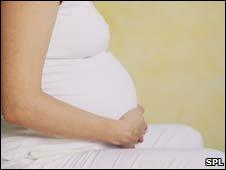Silently suffering with morning sickness
- Published

Hyperemesis gravidarum affects up to 2% of pregnancies
Some women experience morning sickness so severely they consider aborting an otherwise wanted pregnancy. Is enough being done to help women who suffer so profoundly?
The shadow of Thalidomide, the 1960s anti-nausea drug which led to severe birth defects, is thought to be one reason for the wariness on the part of some doctors to offer treatment for the often misleadingly named sickness that strikes at any time of day.
And for most women, it can be kept in check with small, regular meals and taking ginger or peppermint in various guises, until it eventually subsides with the progressing pregnancy.
But in its rarest form, hyperemesis gravidarum, a woman is unable to keep down any food or drink, and usually needs hospitalisation with intravenous fluids and medication to safeguard the health of both her and her baby.
It is thought to affect up to 2% of all pregnant women.
While there is no data on the number of women who terminate their pregnancies as a result, research from the US suggests about 15% of those who suffered had had an abortion because of the condition and a further 10% had come close.
A conference to be held at Warwick University next week is to call for guidelines to be drawn up to ensure that women across the country receive better support, and will hear that earlier intervention in the community could stop women ending up in hospital.
"We think there is a postcode lottery of treatment and some GPs clearly have fears around prescribing ant-nausea medication. Thalidomide still casts a shadow," said University of Lincoln health psychologist Dr Brian Sallow, who has organised the meeting in collaboration with Pregnancy Sickness Support.
"But we also want to challenge some of the prevailing presumptions about sickness in pregnancy and this idea that somehow women are just making a fuss."
Causes unclear
There are a number of anti-nausea medications. As with most medication, these are not specifically licensed for use in pregnant women but doctors can use their professional judgement.
The antihistamines promethazine and cyclizines are the drugs most commonly used to treat morning sickness in the UK, reducing nausea and vomiting in the majority of those who take them.
A study that looked at more than 200,000 women found babies born to women who had taken an antihistamine during their pregnancy were no more likely to have something wrong with them than babies whose mothers had not taken one.
But the advent of any new medication specifically targeted at morning sickness is unlikely, in part because of the difficulty of clinical trials involving pregnant mothers but also because the mechanisms behind pregnancy nausea are not properly understood.
"It may be because no-one really knows what causes it that some health professionals are a bit sceptical about it," said Lorna Phelan, a consultant and spokesperson for the Royal College of Obstetricians and Gynaecologists.
"And it's a balancing act, as you do not want to scare or indeed overtreat the woman experiencing normal pregnancy nausea who will go home and in a couple of weeks feel much better.
"But this is something we take very seriously. Women have died as a result of this."
Sue Macdonald, of the Royal College of Midwives, said time constraints on staff could mean some pregnant women were unclear about when normal nausea tipped over into the abnormal and help should be sought.
"We as professionals need to be sure that we are always tuned in, and that we pick up on what a woman who doesn't want to make a fuss is telling us.
"We need to make sure that women know what to look out for, and know that this is something they can always talk to their midwife or doctor about.
"This subject isn't as high profile as it should or could be."